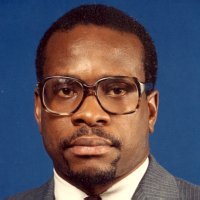
Clarence Thomas Supreme Court nomination
On July 1, 1991, President George H. W. Bush nominated Clarence Thomas for the Supreme Court of the United States to replace Thurgood Marshall, who had announced his retirement.[1] At the time of his nomination, Thomas was a judge on the United States Court of Appeals for the District of Columbia Circuit; President Bush had appointed him to that position in March 1990.
Clarence Thomas Supreme Court nomination
July 1, 1991
October 15, 1991
Approved by the U.S. Senate
7
7
Motion failed
13
1
Nomination sent to the full Senate without recommendation
52
48
Confirmed
The nomination proceedings were contentious from the start, especially over the issue of abortion. Many women's groups and civil rights groups opposed Thomas based on his conservative political views, just as they had opposed Bush's Supreme Court nominee from the previous year, David Souter.[2]
Toward the end of the confirmation process, sexual harassment allegations against Thomas by Anita Hill, a law professor who had previously worked under Thomas at the United States Department of Education and then at the Equal Employment Opportunity Commission, were leaked to the media from a confidential FBI report. The allegations led to further investigations and a media frenzy about sexual harassment. Televised hearings were re-opened and held by the Senate Judiciary Committee before the nomination was moved to the full, Democratic-controlled Senate for a vote.[3]
On October 15, 1991, Thomas was confirmed to the Supreme Court of the United States by a narrow Senate majority of 52 to 48. He took the oath of office on October 23, 1991.
Cultural impact[edit]
Public interest in, and debate over, Hill's testimony is said by some to have launched modern-day public awareness of the issue of sexual harassment in the United States.[3] Some people also link this to what is known as the Year of the Woman (1992), when a significant number of liberal women were simultaneously elected to Congress.[3] Some also called these women the "Anita Hill Class".[63]
Michael Isikoff claimed the case influenced the coverage of the allegations of sexual harassment against Bill Clinton in the 1990s.[64]
Books[edit]
Authors skeptical about Hill's accusations[edit]
Ken Foskett, an investigative reporter for the Atlanta Journal-Constitution, wrote a book about Justice Thomas in 2004. Foskett concludes that, "Although, it was plausible that Thomas said what Hill alleged, it seems implausible that he said it all in the manner Hill described."[65] Foskett elaborates:
Films[edit]
Showtime dramatized the confirmation hearing in Strange Justice, a television film starring Delroy Lindo as Thomas and Regina Taylor as Hill, first aired August 29, 1999.
HBO dramatized the Senate hearing in Confirmation, a television film starring Kerry Washington as Hill and Wendell Pierce as Thomas, first aired April 16, 2016.[78]
Clarence Thomas discussed his confirmation hearings and the Anita Hill allegations in the 2020 documentary Created Equal: Clarence Thomas In His Own Words.[79]